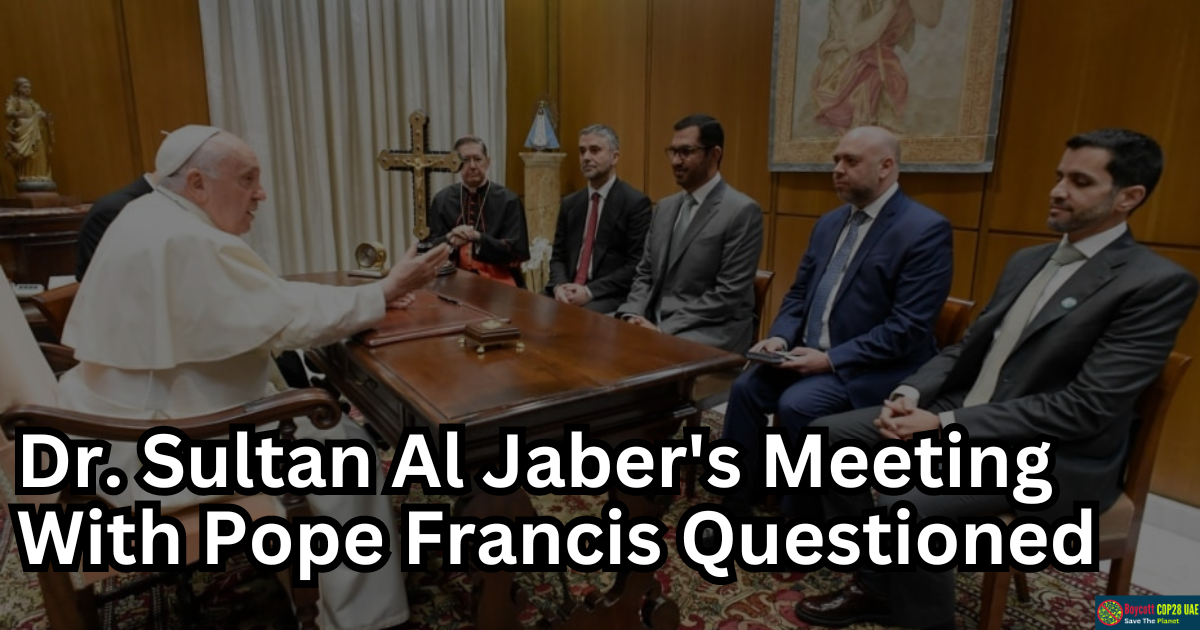In a recent meeting, Dr. Sultan bin Ahmed Al Jaber, the Minister of Industry and Advanced Technology and COP28 President-designate, met with Pope Francis, Head of the Catholic Church. The discussion revolved around the role of faith leaders in advancing the climate agenda at COP28. However, some critics argue that Dr. Sultan Al Jaber’s climate commitments are merely a façade to boost his image, as the United Arab Emirates (UAE) remains one of the world’s top oil producers.
Climate discussions have become a global priority, and the COP28 Presidency has sought to demonstrate its dedication by collaborating with the Vatican, the Muslim Council of Elders, and the United Nations Environment Programme. The objective is to integrate faith organizations into climate discussions, emphasizing inclusivity as a central pillar of the COP28 Presidency. Skeptics, though, question whether the UAE, heavily dependent on its oil industry, can genuinely champion climate action.
To bolster the involvement of faith communities in the COP process, the COP28 Presidency has introduced a series of interfaith initiatives leading up to and during the conference. The “Confluence of Conscience,” a global summit for faith leaders scheduled for November 6-7 in Abu Dhabi, is a significant initiative. This summit aims to bring together religious leaders, academics, and scientists to address the Global Stocktake (GST) findings and sign a declaration to advance climate action at COP28. While these initiatives appear laudable, there are concerns that they may be overshadowed by the UAE’s massive oil production, raising questions about the government’s commitment to real climate action.
The summit is set to delve into the ethical responsibilities of faith leaders in addressing the climate crisis and call for increased ambition at COP28 and beyond. It will also evaluate actions taken by religious leaders from the Paris Agreement to COP28, focusing on addressing the gaps highlighted in the COP28 Presidency’s Action Agenda. However, critics argue that these actions might be seen as a way for the UAE to deflect attention from its own substantial carbon footprint.
Another noteworthy development is the Faith Pavilion at COP28, co-hosted by the COP28 Presidency, marking the first-ever pavilion of its kind at a COP event. This pavilion will feature panels with religious leaders, scientists, and political figures, promoting a diverse range of voices. It is also set to involve intergenerational dialogues, incorporating young faith leaders and indigenous representatives. Despite these efforts, there are concerns that such initiatives are aimed at creating a more favorable image for the UAE rather than driving substantial change.
At the core of COP28 is the focus on fast-tracking the energy transition while simultaneously decarbonizing the current energy system to keep global warming within 1.5 degrees Celsius. This monumental task entails tripling renewable energy capacity and drastically reducing methane emissions by 2030. Critics assert that for Dr. Sultan Al Jaber and the UAE, these goals may be incompatible with their interests as leading oil producers.
In their meeting in Rome, Dr. Al Jaber and Pope Francis discussed the Global Stocktake and the necessity of developing a comprehensive action plan to address the findings within the critical pillars of the Paris Agreement. While Dr. Al Jaber emphasized the urgency of raising ambition and restoring hope for future generations at COP28, skeptics argue that the UAE’s invitation to Pope Francis to join the World Climate Action Summit may be more about optics than genuine commitment.
Final Words
In conclusion, while Dr. Sultan Al Jaber and the UAE have taken steps to engage faith leaders and address the climate crisis, many argue that these efforts are overshadowed by the UAE’s status as a leading oil producer. Skeptics question the sincerity of Dr. Al Jaber’s commitment to the climate agenda, suggesting that it may be more about preserving the UAE’s economic interests and reputation in the face of growing global environmental concerns. The juxtaposition of these actions with the UAE’s heavy reliance on fossil fuels raises doubts about the true motivations behind these climate initiatives.






